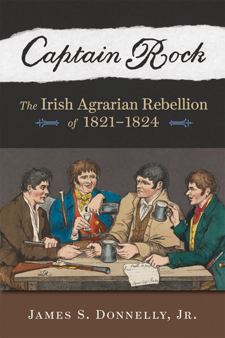The University of Wisconsin Press
Irish History / Politics / Religion
The Shadow of a Year In October 1641 a rebellion broke out in Ireland. Dispossessed Irish Catholics rose up against British Protestant settlers whom they held responsible for their plight. This uprising, the first significant sectarian rebellion in Irish history, gave rise to a decade of war that would culminate in the brutal re-conquest of Ireland by Oliver Cromwell. It also set in motion one of the most enduring and acrimonious debates in Irish history.
Praise: “Gibney's work is deeply researched, well documented, and extremely well written. It will be a valuable resource for lay readers, scholars, and students. Highly recommended.” “The book makes a significant contribution to our understanding of the interactions between history and memory and myth in Ireland.” “A useful, well-written and satisfying guide to the uses and mis-uses of what remains a central tragedy of Irish history.” “Gibney has steeped himself in the polemical literature surrounding the ensuing history of the 1641 rebellion, and his analysis of these issues is meticulous and scrupulous.” There is a press kit for this title. Media & bookseller inquiries regarding review copies, events, and interviews can be directed to the publicity department at publicity@uwpress.wisc.edu or (608) 263-0734. (If you want to examine a book for possible course use, please see our Course Books page. If you want to examine a book for possible rights licensing, please see Rights & Permissions.)
|
“This is the best account to date of how continuing English-language disputations concerning the nature of the insurrection that occurred in Ireland in 1641 influenced present politics for three centuries, in three countries and in two continents. Scholars in the U.S. will benefit especially from John Gibney’s discussion of how the subject was re-opened in a new environment by Matthew Carey, who was responding in part to the inclusion of the extreme Protestant interpretation of the subject in the American editions of Foxe’s Book of Martyrs.” |
||||||||
|
|
If you have trouble accessing
any page in this web site, contact our Web manager. Updated January 13, 2013 © 2013 The Board of Regents of the University of Wisconsin System |
 John Gibney earned his doctorate in history at Trinity College Dublin and is author of Ireland and the Popish Plot. A guide for the popular Historical Walking Tours of Dublin offered by Historical Insights Ireland, he is a frequent contributor to History Ireland magazine and scholarly journals. He has been a research fellow at the University of Notre Dame and the National University of Ireland Galway.
John Gibney earned his doctorate in history at Trinity College Dublin and is author of Ireland and the Popish Plot. A guide for the popular Historical Walking Tours of Dublin offered by Historical Insights Ireland, he is a frequent contributor to History Ireland magazine and scholarly journals. He has been a research fellow at the University of Notre Dame and the National University of Ireland Galway. 
